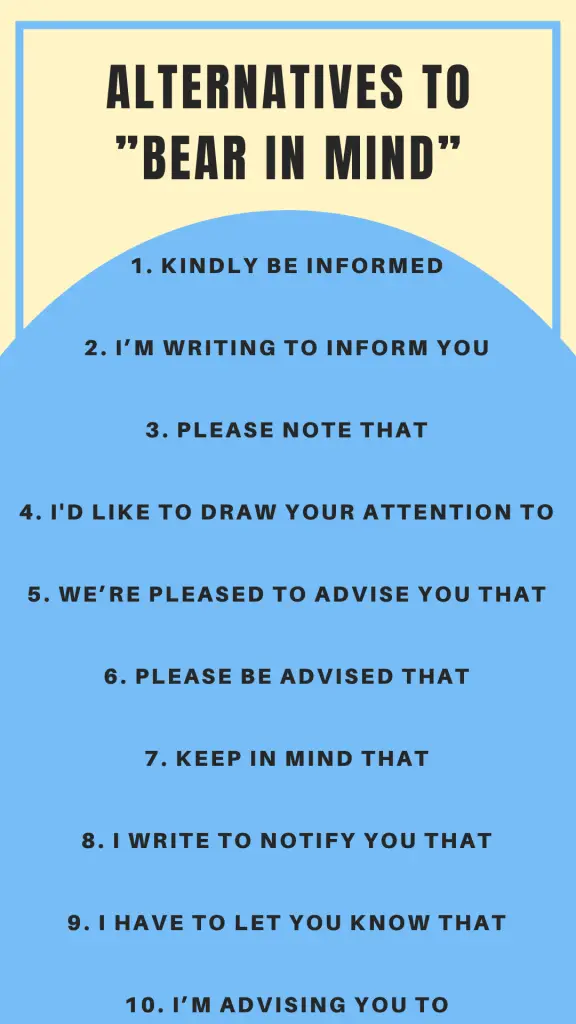Bear in mind is not often used but can be helpful to know what the expression refers to. In this post, you will find out exactly what the phrase means, what alternatives there are, and how it differs from the phrase ”bare in mind”.
What is the Meaning of Bear in Mind?
It means to remember something or “to have someone’s attention fixed on.” When someone tells you to bear something in mind it means to listen carefully and remember their words. They are going to tell you something very important and you shouldn’t ignore it.
For example, the phrase may be used when someone needs to make sure they get an important task done before they leave the office for the day. It can also be used as a reminder for people who have misplaced something and are trying to find it again. For example, if you misplace your wallet at work and you know where you last saw it, bear in mind that’s where it might still be if you are having trouble finding it anywhere else.
Alternatives to ”Bear In Mind”
1. Kindly be informed
Kindly be informed is a phrase that can be used to signal the end of a polite remark. It can also be used to let someone know that they may want to do an action, such as “kindly be informed of your responsibilities”.
2. I’m writing to inform you
This phrase can be used when you write an email message to someone. For example, if you need to inform the client that the delivery will be delayed or that the items they have ordered are out of stock, etc.
3. Please note that
Please note that is a formal phrase that means that something is to be noted or remembered. It can also be used at the end of a letter to make an explanation or request.
4. I’d like to draw your attention to
The purpose of this phrase is to highlight the focused paragraph or some important information. It can be used in business correspondence, presentations, speeches, etc. The reason for using this phrase is that when people are frequently bombarded with tons of information, they tend to ignore most of it and only pay attention to the highlighted part.
5. We’re pleased to advise you that
The meaning of “we’re pleased to advise you,” can be interpreted in two ways: the writer might be happy to provide the recipient with information, or the writer might be happy because they are advising the recipient about something.
6. Please be advised that
It is very similar to the above phrase, but here the polite expression pleased is ignored. In some cases, you can express your opinion more quickly without showing too much politeness and formality.
7. Keep in mind that
Given the context, bear in mind is likely to be used in more formal settings whereas keep in mind may be more likely to occur in informal ones. Both phrases are often used in everyday communication when someone does not want to forget about their intentions with someone or something.
We should also keep or bear in mind that some people use both words interchangeably as a matter of idiom.
8. I write to notify you that
This phrase should also be used when writing emails or letters. It’s a great start to the email of grabbing the recipient’s attention quickly and powerfully.
9. I have to let you know that
I have to let you know that means that I am sorry but I have to tell you that something bad is going to happen. For example, the doctor may say “I have to let you know that we cannot remove all of cancer.”
The meaning of this phrase depends on the context. It could be in a formal setting such as when a doctor tells their patient they need to operate, or it could be in a more casual, conversational setting where someone just tells their friend they will not be able to meet them tonight because they are sick.
10. I’m advising you to
The phrase I’m advising you to can be interpreted as the speaker’s advice or suggestion.
Informal: I advise you to be more respectful at home.
Formal: I advise you to refrain from drinking for the next three days.

Frequently Asked Questions Using the Phrase ”Bear In Mind”
Bear In Mind or Bare In Mind?
Let’s start by saying that the correct phrase is ”bear in mind”. It is an idiom, which means that a literal translation would sound ridiculous. Maybe that’s why most people get confused because, in either version with bear or bare, the literal meaning doesn’t sound good. Some examples are:
Informal:
”Please bear in mind to lock the door when you go out.”
”Bear in mind that you need to call the dentist tomorrow.”
Formal:
”Please bear in mind that the ultimate responsibility in terms of compliance will always remain the end user of the license.”
How to Pronounce ”Bear In Mind”?
The pronunciation of the phrase is the following:
bear in mind
[bair in maind]
Is It Appropriate to Use Bear In Mind in a Formal Email?
Yes! This phrase could work well in your email. We often use it when reminding someone else to take something into consideration which even shows that you care about your client/colleague.

How to Reply When Someone Tells Us to Bear Something In Mind?
1) Your advice has been well noted.
2) Thank you for letting me know!
3) I’ll keep that in mind!
4) Acknowledged!
What are Some Synonyms for ”Bear In Mind”?
Keep in mind
Be aware
Remember
Call to mind
Consider
Be mindful









